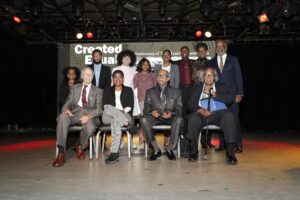
On February 13, 1960, a group of students representing the Tallahassee chapter of Congress of Racial Equality (CORE) sat at a local Woolworth’s lunch counter in protest of persistent segregation, beginning a wave of student activism throughout the city that would send shockwaves throughout the country.
To commemorate the 60th anniversary of the group’s revolutionary protest, some of the sit-in’s participants and their family members gathered at a panel to reflect and share their experiences.
The event, organized by The Village Square, featured Priscilla Stephens-Kruize, John Due and Tananarive Due — the sister, husband, and daughter, respectively, of the late CORE leader Patricia Stephens Due.
Also featured were Henry Steele — the son of civil rights activist C.K. Steele — who protested in the sit-ins at the age of 16, and Dan Harmeling, a then-University of Florida student who led movie theater sit-ins and other protests throughout North Florida during the 1960s.
Seven days following the first sit-in, another Woolworth’s sit-in was staged, at which 11 students were promptly arrested and placed in jail. Several protestors, including the Stephens sisters and Steele, refused to pay bail, instead opting to serve their full 60-day sentences — later reduced to 49 days due to good behavior — as a “jail-in” that would help inform their fellow Florida A&M University students about their poor treatment.
“Without the students, there would have been no movement in Tallahassee,” Steele claimed.
The life and work of Patricia Stephens Due, the younger of the two sisters, was a major focus throughout the duration of the panel. Stephens Due, who died in 2012, rose to prominence as an activist during her time at FAMU from 1960 to 1963.
Her daughter Tananarive — with whom Stephens Due co-authored “Freedom in the Family: A Mother-Daughter Memoir of the Fight for Civil Rights,” released in 2003 — described her mother as “courageous,” saying that “In the face of fear, she did not back down.”
She recalled a story of her mother leading a crowd of 1,000 FAMU students across the railroad tracks, where a police officer recognized her and threw acid at her face, which forced her to wear dark glasses for the rest of her life.
Johnita Due, another of Stephens Due’s three daughters, sat in the audience throughout the discussion but took the stage at its conclusion to share her own stories of her late mother.
“Our mother, first and foremost, wanted our history to be told,” Due said. “She wanted the history of all of the foot soldiers to be remembered.”
Stephens-Kruize recalled her time in jail with her younger sister, having to share a bed and playing cards to pass the time over the 7-week period. She also explored a time before the sit-ins, detailing her upbringing with her sister that found the two trying to make a difference by frequently patronizing white establishments in attempts to desegregate them, even if only for a moment.
Tananarive consoled her aunt, who had become visibly emotional, telling her that “When I look at this room, the first thing I see is a direct impact that you, my mom and all of you up here have had on this community… and people are going to pick up that baton.”
At the discussion’s conclusion, the panel instructed the audience to ask themselves a critical question: “Are we sitting together now?”
Responses to the question were as diverse as the crowd of individuals that it was asked to.
Harmeling claimed that only a small group has accomplished the task of sitting together in harmony, and cited his relationship with the Due family as an example of interracial connections enriching the hearts of those involved.
Jasmine Hudson, a senior at FAMU and vice president of the university’s NAACP chapter, believed that “we still have to grow, understand one another’s cultures and backgrounds… and break down our own barriers before we can completely come together.”
While the capital city’s history was defined by the efforts of heroic students in generations past, the fate of Tallahassee’s future lies firmly in the hands of the students of today. Thursday’s panel dialogue marked a sign of progress towards a definitive answer to the night’s central question, and that answer will be “Yes.”